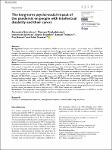The long-term psycho-social impact of the pandemic on people with intellectual disability and their carers
| dc.contributor.author | Gabrielsson, A | |
| dc.contributor.author | Moghaddassian, M | |
| dc.contributor.author | Sawhney, I | |
| dc.contributor.author | Shardlow, S | |
| dc.contributor.author | Tromans, S | |
| dc.contributor.author | Bassett, P | |
| dc.contributor.author | Shankar, Rohit | |
| dc.date.accessioned | 2023-07-31T14:46:47Z | |
| dc.date.available | 2023-07-31T14:46:47Z | |
| dc.date.issued | 2023-05-16 | |
| dc.identifier.issn | 0020-7640 | |
| dc.identifier.issn | 1741-2854 | |
| dc.identifier.uri | https://pearl.plymouth.ac.uk/handle/10026.1/21103 | |
| dc.description.abstract |
<jats:sec><jats:title>Background:</jats:title><jats:p> People with intellectual disabilities (PWID) are at six times higher risk of death due to COVID-19. To mitigate harm, as a high-risk group, significant social changes were imposed on PWID in the UK. Alongside these changes, the uncertainty of the pandemic influence, caused PWID and their carers to encounter significant stress. The evidence of the pandemic’s psycho-social impact on PWID originates mainly from cross-sectional surveys conducted with professionals and carers. There is little research on the longitudinal psycho-social impact of the pandemic from PWID themselves. </jats:p></jats:sec><jats:sec><jats:title>Aims:</jats:title><jats:p> To examine the long-term psycho-social impact of the pandemic on PWID. </jats:p></jats:sec><jats:sec><jats:title>Methods:</jats:title><jats:p> A cross-sectional survey, following STROBE guidance, of 17 Likert scale statements (12 to PWID and 5 to their carers) to ascertain the pandemic’s psychosocial impact was conducted. Every other PWID open to a specialist Intellectual Disability service serving half a UK County (pop:500,000) was selected. The same survey was re-run with the same cohort a year later. Descriptive statistics, Mann-Whitney, Chi-square and unpaired-t tests were used to compare responses. Significance is taken at p < .05. Comments were analysed using Clarke and Braun’s approach. </jats:p></jats:sec><jats:sec><jats:title>Results:</jats:title><jats:p> Of 250 PWID contacted, 100 (40%) responded in 2020 and 127 (51%) in 2021. 69% (2020) and 58% (2021) reported seeking medical support. Carers, (88%, 2020 and 90%, 2021) noticed emotional changes in PWID they cared for. 13% (2020) and 20% (2021) of PWID had their regular psychotropics increased. 21% (2020) and 24% (2021) had their pro re nata (PRN) medication adjusted. PWID or carers demonstrated no statistically significant variation in responses between themselves from 2020 to 2021. PWID were more likely to report being upset/distressed compared to their carers’ perceptions of them in both years ( p < .001). Four themes were identified. </jats:p></jats:sec><jats:sec><jats:title>Conclusion:</jats:title><jats:p> This longitudinal study highlights the diverse psycho-social impact of the pandemic on PWID in the UK. The Pandemic’s psycho-social impact has been significantly underestimated. </jats:p></jats:sec> | |
| dc.format.extent | 002076402311743-002076402311743 | |
| dc.format.medium | Print-Electronic | |
| dc.language | en | |
| dc.publisher | SAGE Publications | |
| dc.subject | COVID-19 | |
| dc.subject | developmental disabilities | |
| dc.subject | developmental disorders | |
| dc.subject | mental health | |
| dc.subject | long term harm | |
| dc.title | The long-term psycho-social impact of the pandemic on people with intellectual disability and their carers | |
| dc.type | journal-article | |
| dc.type | Journal Article | |
| plymouth.author-url | https://www.webofscience.com/api/gateway?GWVersion=2&SrcApp=PARTNER_APP&SrcAuth=LinksAMR&KeyUT=WOS:001002286000001&DestLinkType=FullRecord&DestApp=ALL_WOS&UsrCustomerID=11bb513d99f797142bcfeffcc58ea008 | |
| plymouth.publication-status | Published online | |
| plymouth.journal | International Journal of Social Psychiatry | |
| dc.identifier.doi | 10.1177/00207640231174373 | |
| plymouth.organisational-group | |Plymouth | |
| plymouth.organisational-group | |Plymouth|Faculty of Health | |
| plymouth.organisational-group | |Plymouth|Users by role | |
| dc.publisher.place | England | |
| dcterms.dateAccepted | 2023-01-01 | |
| dc.date.updated | 2023-07-31T14:46:47Z | |
| dc.rights.embargodate | 2023-8-1 | |
| dc.identifier.eissn | 1741-2854 | |
| dc.rights.embargoperiod | forever | |
| rioxxterms.versionofrecord | 10.1177/00207640231174373 |


